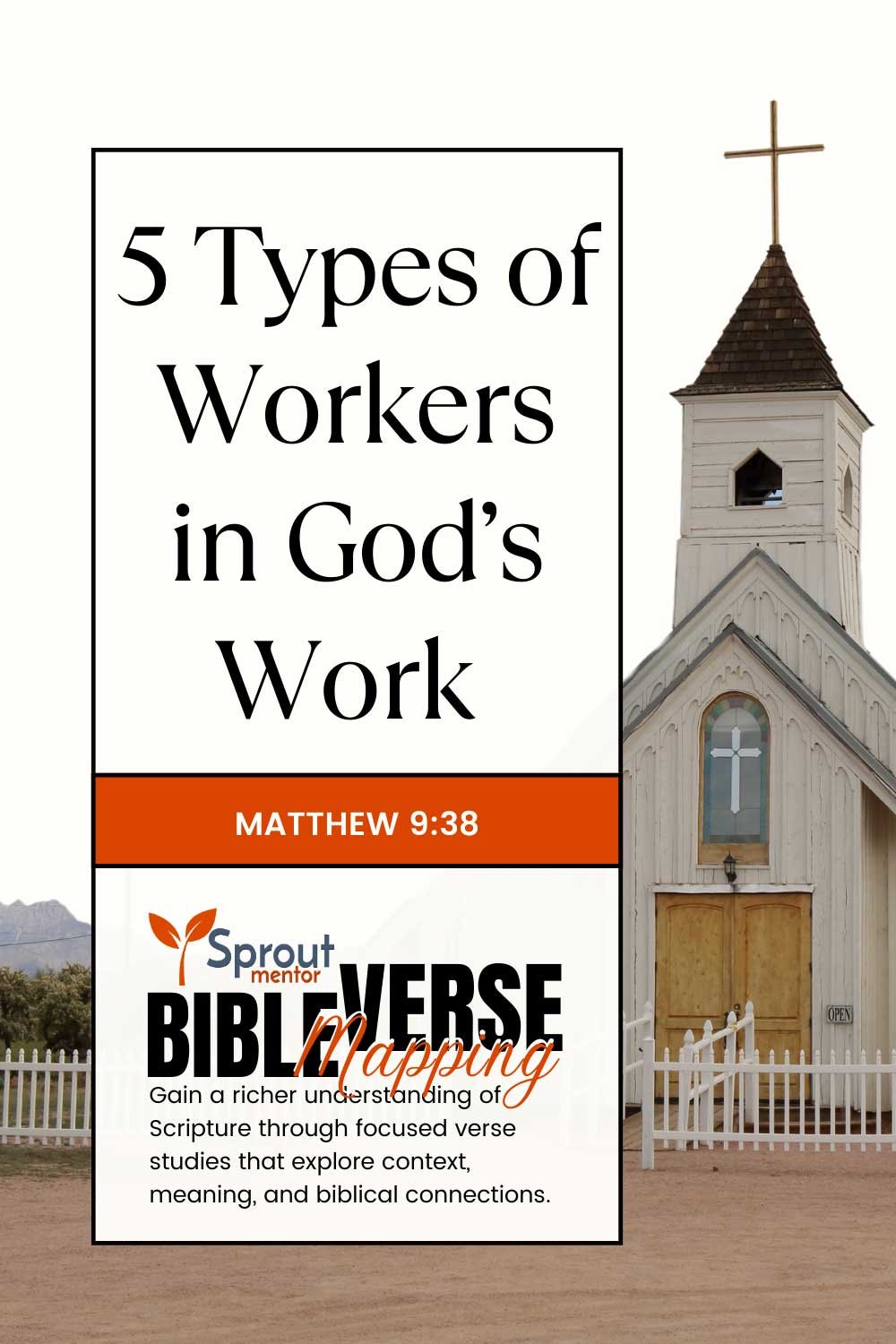5 Types of Workers in God’s Work (Matthew 9:38)

Share This Blog Post On:
Short on time, but big on faith? We break down complex topics into easy-to-understand chunks, making the Bible accessible to everyone. Join us for answers to your Bible questions and encouragement for your daily walk with God. Click here to grow your faith, one byte at a time!
“Ask the Lord of the harvest, therefore, to send out workers into his harvest field.” (Matthew 9:38, NIV)
This verse highlights the immense need for workers in God’s kingdom. These workers, though diverse in their roles, share a unified goal of advancing God’s purpose. Let’s explore the five types of workers in God’s work and their unique contributions.
#1 – The Harvesters
Harvesters are those who step into the fields and bring in the crop, representing evangelists in the spiritual realm. They boldly proclaim the Gospel, leading people to Christ. Just as a farmer thrusts a sickle to gather ripe grain, evangelists labor to reach souls ready for salvation.
Paul encourages this work in 2 Timothy 4:5, saying, “Do the work of an evangelist, fulfill your ministry.” The harvester’s task requires urgency and focus because, as Jesus said in John 4:35, “The fields are already white for harvest.” Evangelists are on the front lines, working tirelessly to draw people from darkness into the light of God’s kingdom.
#2 – The Gatherers
Gatherers are akin to shepherds who gather and care for the flock. Pastors take the harvested crop and ensure it is brought into the storehouse—symbolizing the nurturing and discipling of believers within the church. They provide guidance, care, and protection, ensuring the community of faith grows strong and united.
In 1 Peter 5:2, we find a direct charge to pastors: “Shepherd the flock of God that is among you, exercising oversight.” Like gatherers in the harvest, pastors must be vigilant and attentive, binding up the brokenhearted (Isaiah 61:1) and leading with humility and love.
#3 – The Threshers
Threshers work to separate the valuable grain from the stalks and husks, a role that mirrors teachers of the Word. Teachers help believers discern truth from error and deepen their understanding of Scripture. This process equips the church to grow in spiritual maturity, laying a foundation for a strong faith.
Paul highlights the importance of teachers in Ephesians 4:11-12, noting that they are essential for “the equipping of the saints for the work of ministry, for the edifying of the body of Christ.” Just as the threshing process requires precision and patience, teaching the Word demands clarity, insight, and dedication to rightly dividing the Word of truth (2 Timothy 2:15).
#4 – The Winnowers
Winnowing involves using wind to separate the wheat from the chaff, symbolizing the work of prophets. Prophets bring a fresh wind of the Holy Spirit, helping the church discern God’s will and purifying it from distractions or sin. They call believers to repentance, renewal, and alignment with God’s purposes.
Ezekiel 37:9-10 portrays a powerful image of the Spirit’s wind bringing life to dry bones, a role prophets often play in awakening the church. Additionally, 1 Corinthians 14:3 describes the role of prophecy as one of strengthening, encouragement, and comfort. Winnowers, through their sensitivity to the Holy Spirit, prepare the church for fruitful service.
#5 – The Guards
After the harvest is brought in, it must be protected from theft, pests, or spoilage. Guards in God’s kingdom are the watchmen and intercessors who cover the work with prayer and vigilance. They stand in the gap, ensuring that the enemy does not steal what God has accomplished.
In Ezekiel 22:30, God laments the lack of intercessors: “I looked for someone among them who would build up the wall and stand before me in the gap on behalf of the land, but I found no one.” Guards are critical in spiritual warfare, praying for protection and provision for the harvest. Their ministry ensures that the grain—the souls of men—remains safe until it reaches its final purpose.
In conclusion, each of these roles—harvesters, gatherers, threshers, winnowers, and guards—is vital in the work of God’s kingdom. Together, they reflect the varied ways God calls His people to labor for His glory. While some may go out into the fields as evangelists, others stay within the storehouse, discipling, teaching, or interceding. The harvest is plentiful, but the workers are few. As we heed Jesus’ call to pray for more laborers, may we also be willing to step into the field, embracing the role God has prepared for us.
Continue Reading More On:
|


![6-Essentials-You-NEED-to-Chase-Your-Dreams-[Genesis-121-6]](https://sproutmentor.com/wp-content/uploads/2024/05/6-Essentials-You-NEED-to-Chase-Your-Dreams-Genesis-121-6.jpg)




